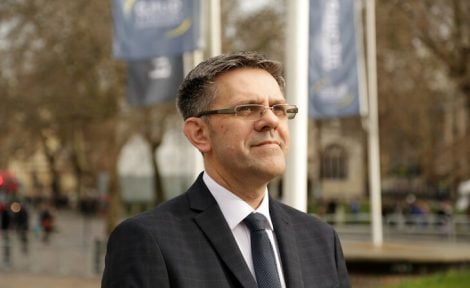COMMENT: the naming of Javad Marandi is a milestone for AML
Anti-money laundering expert Simon Luke says press coverage of the Tory donor serves as a stark reminder to dissuade others from similar activities.

News broke earlier this month that Javad Marandi, a business tycoon and major Tory donor, could be named as part of a global money laundering investigation after losing his battle with the BBC to remain anonymous.
An investigation by the National Crime Agency discovered Mr Marandi’s overseas interests had a key role in a wide-ranging money-laundering scheme involving Javanshir Feyziyev, one of Azerbaijan’s richest oligarchs.

For the anti-money laundering community, it’s a major milestone. The ruling not only upholds the principles of a free press, but also stands as a testament to the persistence of anti-money laundering (AML) efforts.
By shedding light on the profound consequences such actions can inflict on one’s reputation, it serves as a stark reminder to dissuade others from partaking in similar activities.
Hopefully this news encourages businesses to take a more proactive approach to anti-money laundering procedures. But how did it come about?
And why is it a milestone moment for anti-money laundering?
TWO SIDES
In recent years, there has been a growing attempt to safeguard privacy laws in courts.
Of course, principles such as data privacy are fundamental rights that need to be upheld. But when it comes to cases of public interest and schemes that use illicit and harmful money, anonymity simply protects those involved and allows dangerous criminal activity to flourish.
In ruling that the media could name Mr Marandi, the judges concluded that “open justice was a fundamental principle and that anonymity should only be allowed in exceptional circumstances”.
The BBC article goes on to say how the Court of Appeal stated that Marandi had the opportunity to refute the allegations “in detail when he put in his evidence in support of his claim for anonymity. Instead, he chose to rest on a bare denial of wrongdoing.” It signalled potential red flag behaviour.
However, this ruling stands at odds with another recent ruling: the EU’s changes to public register access rules, allowing member states the option to restrict public access to ultimate beneficial ownership (UBO) registers.
This is making the process of identifying potential money laundering links that much harder and follows a trend of closing back down public transparency to corporate ownership details.
PROPERTY
What does this mean for anti-money laundering in real estate?
Property is one of the oldest ways to launder money and is attractive to bad actors (as it is generally stable financially and offers a physical asset that can be used by launderers).
The Marandi case emphasises how dirty money can travel between countries and through various bank accounts and shell companies that don’t have a traceable record of activities.
Real estate contends with the same issues, with money invested into properties after being passed through different accounts and offshore companies.
This makes the process of identifying UBOs that much harder and protects anonymity. While the ruling champions how proper AML processes can bring to light such networks, it also reflects the need for businesses to have robust AML procedures in place, especially with public registers being restricted.
COMPLIANCE
For property professionals, this means implementing the necessary training and building a culture of compliance.
This comes from understanding red flag activity, such as third-party involvement, irregular sale prices and large cash transactions for deposits and other fees.
It’s a process that enhances due diligence and promotes treating onboarding prospects amongst employees as an ethical practice.
The Marandi ruling could be a landmark moment for AML that removes anonymity when it’s needed and in the public interest.
Money launderers like to operate in the dark and the EU’s recent changes to the UBO register access make this easier. Hopefully this case sets a trend for bringing about more transparency and openness to AML processes when necessary.
By effectively naming those in the wrong it can act as a warning light to others who are engaged in similar schemes.
Simon Luke is UK Country Manager of First AML





